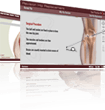Pre-op & Post-op Instructions
Preoperative Class :: Postoperative Recovery
Preoperative Class
At the Arthritis Institute, we realize that your upcoming surgery is extremely important to you and your family. As our patient, you will benefit from state-of-the-art technology, the latest surgical technologies, and the talents of a cohesive team of highly skilled health care professionals.
Your active involvement in your recovery is important to us. Preoperative planning by the patient and surgical team begins the moment a decision is made to proceed with surgery. We encourage your participation in all of the pre and postoperative decisions necessary for the best possible outcome. As an informed and knowledgeable patient, you will be better able to participate in your care and recovery.
The Arthritis Institute team offers a free preadmission orientation program. Through this unique learning opportunity, you will learn about all phases of your surgery, implants, hospitalization, and the recovery process. This program is held weekly, and you are encouraged to attend.
Your Doctor is the key figure in helping you prepare for surgery.
- Surgery schedule: Your doctor’s office staff will schedule your surgery and provide information about the time of surgery including what time to arrive
- Medications: Your doctor will talk to you about the amount of pain to expect after surgery and how we will help manage it. You should stop taking certain medications-such as aspirin, ibuprofen and other anti-inflammatory medications two weeks before surgery to help control bleeding. Tylenol or stronger narcotic medicines may be prescribed to help manage your pain preoperatively. You MUST have nothing to eat or drink after midnight the evening prior to surgery. Failure to do so will cause delay and possible cancellation of your surgery
- Blood Transfusions and Donations: You can either donate your own blood before you are hospitalized, ask a family member or friend to donate blood for use during your surgery, or use blood from the hospital’s blood bank
- Pre-Operative medical clearance: You should see your private physician at least two weeks before your surgery to ensure that your health is in balance, your medications are providing good control, and so that adequate pre operative testing can be performed. (bloodwork, electrocardiogram, and possibly a chest xray
Postoperative Recovery
Considerations / Home Assessment
Exterior: Steps and handrails should be in good repair, with handrails on stairs, nonskid treads on outside steps.
Interior: All rooms and halls well illuminated.
Rooms and hallways: should be uncluttered – remove throw rugs and cords from walkway.
Store commonly used supplies in the kitchen and bathroom in cabinets and drawers where they may be easily reached.
Stock up on pre prepared foods and staple items.
Safety Bars: by toilet and/or bathtub; safety/traction stickers on floor of tub.
Adaptive devices: These devices (reacher, long handled sponge, sock aid) are designed to assist you in performing some of the simple activities of daily living which will be somewhat difficult during your recovery. Most insurance companies, including Medicare, do not pay for these items, so please check with your carrier before purchasing them if you are expecting reimbursement. They may be purchased at a local medical supply store.
Home medications: Most patients will not need to take antibiotics after discharge. You will be given tablets/capsules for pain. Anticipate your pain medicine needs as the weekend approaches, so that we may refill your medication with a minimal delay.
When to call the doctor: In the preoperative class we will discuss surgical risks and post operative complications. Should you experience any sudden change in your recovery such as fever (greater than 100.5), a change in your pain pattern, or sudden increase in the expected post surgical swelling (or sudden swelling in the opposite leg), do not hesitate to call your surgeon. Remember that some degree of swelling is to be expected for 6 – 8 weeks, and will gradually resolve.













